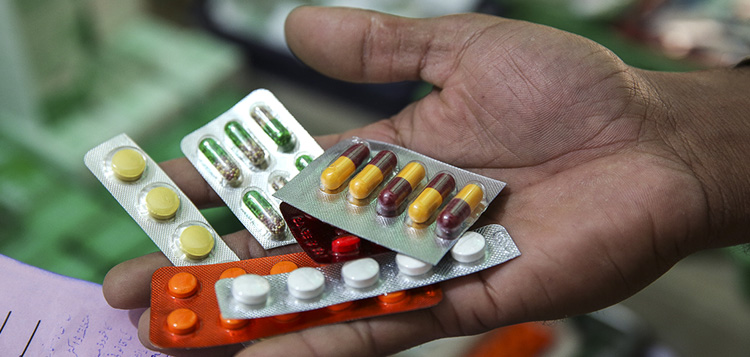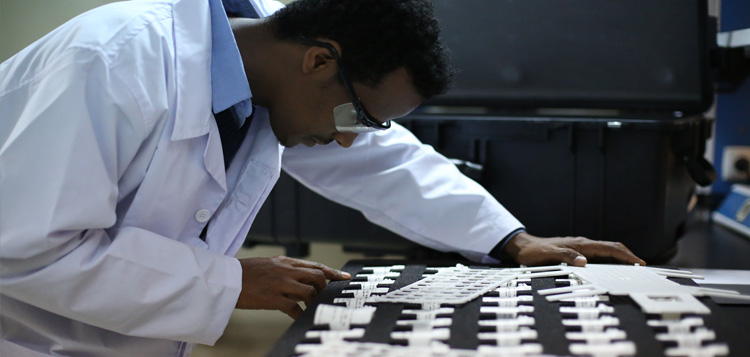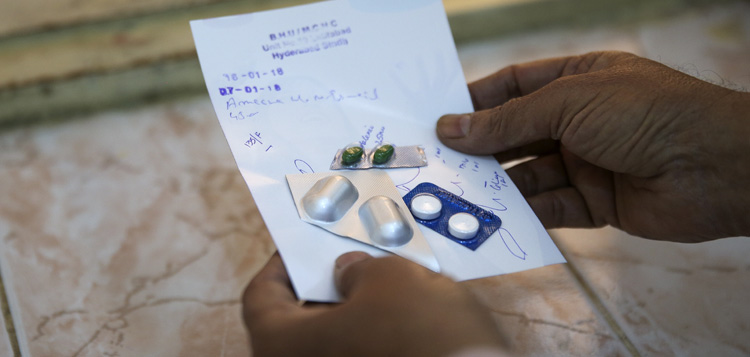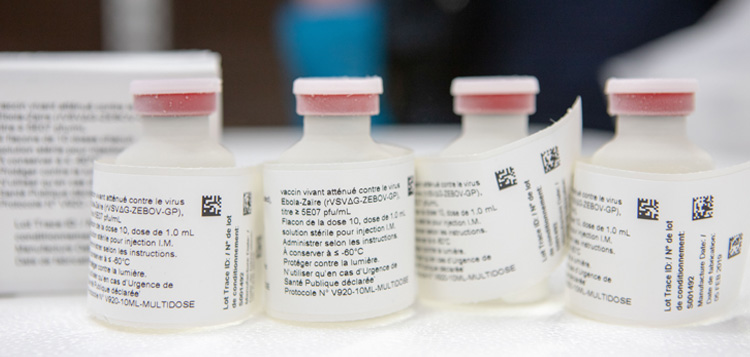Technical cooperation
Essential medicines and pharmaceutical policies
Quality and safety of medicines
Efficient supply chain systems
Local production of quality medicines and vaccines
Essential medicines and pharmaceutical policies
 Photo credit: WHO/Asad Zaidi
Photo credit: WHO/Asad Zaidi
Essential medicines are those that meet the priority health needs of a population. They are chosen based on disease prevalence, evidence of safety and efficacy, and relative cost-effectiveness.
In a functioning health system, essential medicines should be available:
at all times in adequate amounts
in suitable dosage forms
with assured quality and adequate information
at a price that both individual and community can afford.
How the concept of essential medicines is applied is meant to be flexible and adaptable to many contexts. Exactly which medicines are deemed essential is a national responsibility. WHO’s medicines strategy responds to country needs by focusing on medicines policy; access; quality and safety; and rational use.
WHO provides technical support to ensure that national essential medicines lists are revised regularly to align with the latest WHO Model List of Essential Medicines. National essential medicines lists must also consider emerging health priorities and reflect updates in evidence and its application in the development of hospital and primary care drug lists.
WHO continues to support countries and territories to develop, adopt and implement national medicines policies and essential medicines lists. It also helps strengthen the evidence-based selection of treatments using health technology assessment. Since 2021, WHO has supported the Islamic Republic of Iran, Jordan, Pakistan and Syria to update their national essential medicines lists to include the AWaRe (Access, Watch, Reserve) classification of antibiotics. Lebanon developed a national pharmaceutical policy in May 2022.
WHO supports assessments of the pharmaceutical sector in countries and territories. Data for pharmaceutical profiles have been collected for Afghanistan, Iraq, Lebanon, the occupied Palestinian territory, Oman, Pakistan and Syria. These data are from a survey used to measure key aspects of the pharmaceutical sector, which was developed to monitor progress in efforts to improve access to essential medicines.
Quality and safety of medicines
 Photo credit: WHO/Colin Cosier
Photo credit: WHO/Colin Cosier
Medicine quality varies greatly, especially in low- and middle-income countries. Use of ineffective, low-quality, harmful medicines can lead to failure of treatment, aggravation of the disease, drug resistance and even death. It also reduces confidence in health systems, health workers, pharmaceutical manufacturers and distributors.
Money spent on ineffective, poor-quality medicines is wasted – whether by consumers or governments. Effective medicine regulation and quality assurance are fundamental to public health. Governments need to establish strong national regulatory authorities (NRAs) to effectively regulate the manufacture, trade and use of medicines.
WHO provides technical support to improve the effectiveness of NRAs to:
assess and monitor the quality, safety and efficacy of medicines and health technologies;
detect substandard and fake medical products; and
develop the national quality assurance capacity.
WHO supported Egypt, Jordan, Oman, Pakistan, Saudi Arabia and Tunisia to devise NRA institutional development plans and a road map for benchmarking. Technical sessions on the NRA benchmarking concept and self-benchmarking exercise were organized for regulators of all countries and territories. This effort aimed to strengthen national systems to ensure effective implementation of vaccines regulation, as well as regulation of other medicines and biological products.
The Eastern Mediterranean Drug Regulatory Authorities Conference brings together NRAs from across the Eastern Mediterranean Region, as well as regulatory leaders from regional and global organizations. WHO devised the biennial event to foster collaboration between NRAs, enable the exchange of experiences, and promote initiatives to harmonize regulatory activities.
WHO promotes pharmacovigilance activities through membership of the WHO Programme for International Drug Monitoring. It also builds country and territory capacities to report adverse drug reactions, adverse events following immunization, medication errors and lack of therapeutic efficacy. Kuwait, Lebanon, Libya and Yemen are the latest countries of the Region to become full members of the Programme for International Drug Monitoring – bringing the total from the Region to 17 countries.
To engage countries in the collaborative registration procedure (CRP), WHO conducts meetings for NRAs to increase their knowledge of CRP mechanisms, processes, requirements and tools, and to support CRP implementation in countries.
Efficient supply chain systems
 Photo credit: WHO/Ala Kheir
Photo credit: WHO/Ala Kheir
A pharmaceutical supply chain system should ensure that health supplies are available and accessible to all end users. It should do this efficiently by making optimal use of limited resources and it should develop national capacities to sustain the gains.
Fragmented procurement and supply chain management practices in countries often cause inefficient processes that result in higher prices, interruptions in supply, and wasted resources.
WHO supports the establishment of policies and good practices, as well as capacity-building, to improve governance, efficiency and quality of procurement and supply chain management, in times of routine and emergency. Jordan and Libya have each carried out an assessment of their national medical supply chain systems.
Rational use of medicines
 Photo credit: WHO/Asad Zaidi
Photo credit: WHO/Asad Zaidi
Irrational use of medicines and other health technologies is widespread. Activities to promote the rational use of medicines need to be fully integrated into the health system across various national health programmes, sectors and stakeholders.
Rational use of medicines means that patients receive medicines:
appropriate to their clinical needs;
in doses that meet their individual requirements;
for an adequate period of time; and
at the lowest cost to them and their community.
Irrational use of medicines not only reduces the potential usefulness of medicines and health technologies but also results in negative therapeutic and economic outcomes.
In developing countries, more than 50% of patients who do receive medicines are prescribed them incorrectly – and over half of these people fail to take their medicines correctly. Antibiotic resistance is a major clinical and public health problem that results in treatment failures, disability and even death, and directs huge spending to the development of new generation antibiotics.
WHO provides support to countries and territories to establish medicines and therapeutics committees at the health facility level. Their focus is to improve the rational use of medicines and national medicines supply chain systems.
WHO conducts training workshops on national antimicrobial consumption surveillance and hospital antimicrobial consumption monitoring. Enrolled in the Global Antimicrobial Resistance and Use Surveillance System (GLASS) are: Afghanistan, Egypt, the Islamic Republic of Iran, Iraq, Jordan, Kuwait, the occupied Palestinian territory, Oman, Pakistan, Qatar, Somalia, Syria, Tunisia and Yemen. In addition, Egypt, the Islamic Republic of Iran, Iraq, Jordan and Tunisia have shared their national antimicrobial consumption data.
Local production of quality medicines and vaccines
 Photo credit: WHO/Mark Nieuwenhof
Photo credit: WHO/Mark Nieuwenhof
The pharmaceutical industry is one of the fastest-growing industries worldwide. This growth is put down to growing global demand for medications, especially from emerging economies. A greater emphasis on health care standards and continuous research on illness prevention and treatment has also prompted more development in the field.
For national economies, the pharmaceutical industry is a major source of employment and earnings. But like any other industry, it remains subject to dynamic market shifts. The current interest in the local production of medicines and vaccines is significant, both as a strategy to improve access to medicines and vaccines and for industrial and economic development.
Studies show, however, that the conditions under which local production in developing countries would increase their self-sufficiency in pharmaceutical supply are highly complex. So too are the ways in which this would promote greater access to medicines. A clear framework that links local production to greater access from the outset is urgently called for to harness the full potential of local production capacities.
The WHO Regional Office for the Eastern Mediterranean has held:
a training workshop on key enabling factors for successful local production and supply of quality-assured medical products;
a regional technical workshop on vaccine manufacturing, with the Coalition for Epidemic Preparedness Innovations; and
an expert consultation to develop a regional vaccine production strategy with a focus on COVID-19 vaccines.
WHO provided technical support to Egypt to evaluate its vaccine production capacities prior to embarking on COVID-19 vaccine production for the country and also targeting the Eastern Mediterranean Region and some African countries. A regional strategy to increase vaccine production in the Eastern Mediterranean Region is being drafted.
Egypt, the Islamic Republic of Iran, Pakistan and the United Arab Emirates manufacture COVID-19 vaccines, and 8 COVID-19 vaccines were produced in 2021. Egypt, Pakistan and Tunisia were also chosen as recipients of mRNA technology.
Read our publications
Implementing quality management systems in national regulatory authorities: examples and practices
Regulation of vaccines: building on existing drug regulatory authorities
Managing conflicts of interest: a how-to guide for public pharmaceutical-sector committees in low- and middle-income countries[LD1]
Policy paper on traceability of medical products
A study on the public health and socioeconomic impact of substandard and falsified medical products
WHO model list of essential medicines: 22nd list (2021)
WHO model list of essential medicines for children: 8th list (2021)
The pursuit of responsible use of medicines: sharing and learning from country experiences
Regulation of medical devices: a step-by-step guide
Blood and other products of human origin
Action framework to advance universal access to safe, effective and quality-assured blood products 2020–2023[LD3]
Global status report on blood safety and availability 2021
Global status report on blood safety and availability 2016
Guidance on centralization of blood donation testing and processing
A guide to establishing a national haemovigilance system
Regional status report on blood safety and availability 2016
Strategic framework for blood safety and availability 2016–2025
The urgent need to implement patient blood management: policy brief
Get connected
Dr Houda Langar
Regional Adviser and Unit Lead, Access to Medicines and Health Technologies
Email:
Dr Adi Al-Nuseirat
Technical Officer, Access to Pharmaceuticals
Email:
Dr Yetmgeta Eyayou Abdella
Medical Officer, Blood and other Products of Human Origin
Email:
Mr Mohamad Wehbi
Technical Officer, Access to Medical Devices
Email:
Ms Maryan Selwanis
Programme Assistant
Email:
Ms Heba Hassanin
Programme Assistant
Email:








